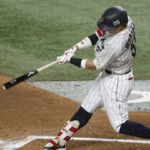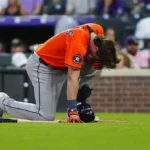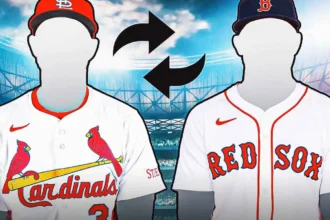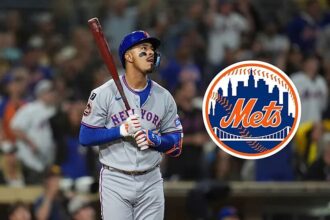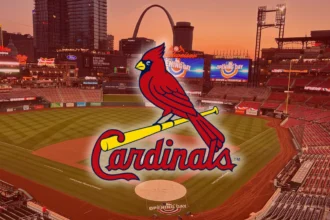The Philadelphia Phillies enter this offseason with both optimism and urgency, knowing that the decisions they make over the next several months could define their trajectory for years to come. After a season marked by electric offense, high expectations, and another deep postseason push, the front office is preparing for a pivotal winter. Their challenge is to build a roster capable of staying competitive in a tightening National League landscape while balancing the realities of aging stars, looming free agency decisions, and the limitations of roster flexibility.
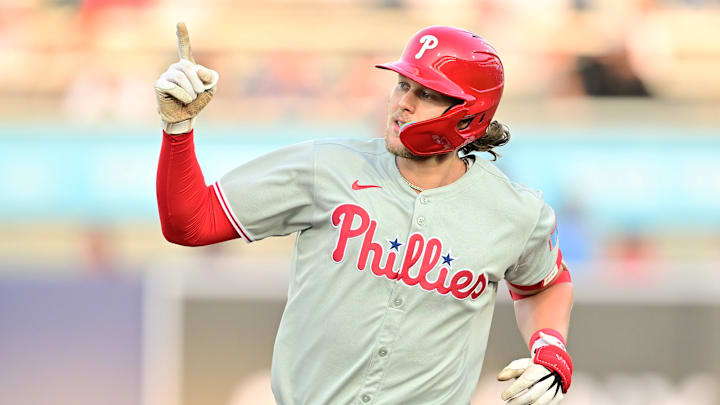
One of the primary questions surrounding the Phillies is how to manage their internal core. The team has made it clear that keeping certain foundational players remains a top priority. Kyle Schwarber, whose bat and clubhouse value have become essential to Philadelphia’s identity, is one of those cornerstone pieces they want to retain. Another key player they aim to keep is longtime catcher JT Realmuto, whose combination of elite defense, offensive production, and leadership is difficult to replace. While neither player is expected to be moved barring unforeseen circumstances, their futures remain part of a larger puzzle the Phillies must solve.

However, in order to improve the roster and address areas of inconsistency particularly on offense, Philadelphia may have to consider making tough decisions with other players. One name that has surfaced repeatedly in offseason speculation is third baseman Alec Bohm. Once viewed as a long-term building block, Bohm has shown flashes of becoming an impact player but has also experienced streaks of inconsistency that have left evaluators wondering whether he has reached his ceiling. His defensive improvement over the past two seasons has been noticeable, yet the Phillies have reached a point where they must weigh whether they believe Bohm is capable of taking another leap forward or whether his value may be greater as a trade chip.
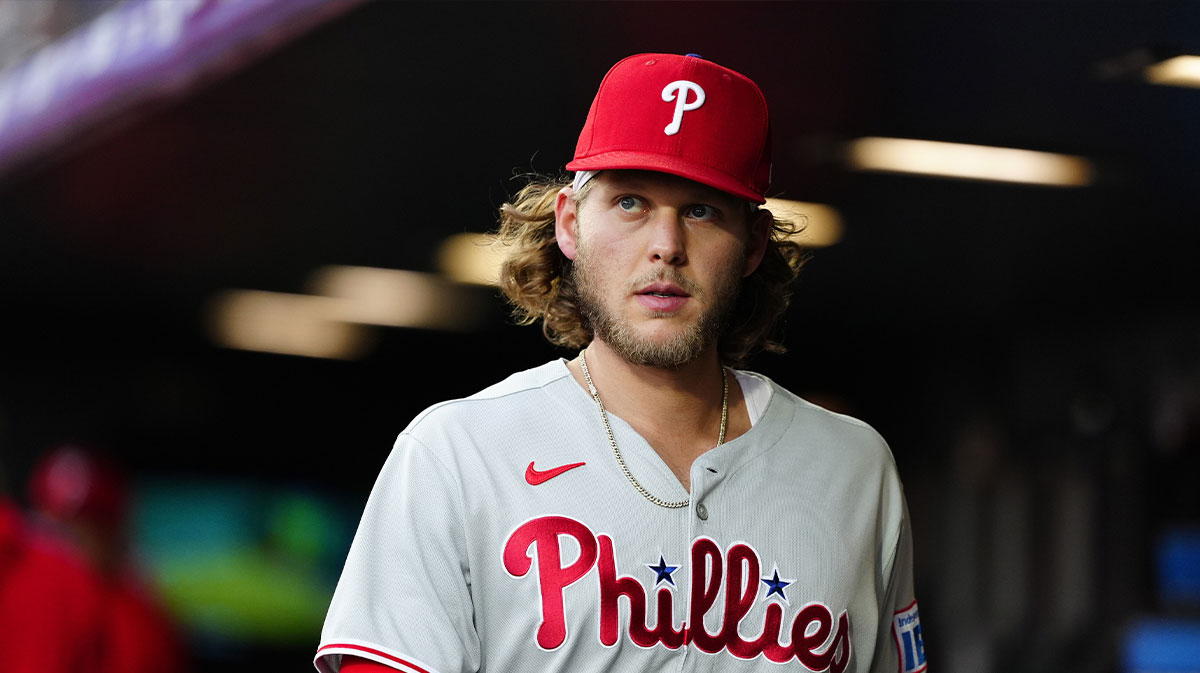
According to MLB insider Jon Morosi, the Phillies would only consider parting with Bohm under one very specific condition: a genuine opportunity to secure a significant upgrade at the position. As Morosi explains, “If the Phillies were to move Bohm, in my judgment, it would have to be because they think there’s a chance of getting a Bregman or they’re one of the teams potentially that could look at a Bo Bichette at a spot that’s not shortstop. There’s different ways they could augment their club, but you would have to have a clear upgrade on Bohm if you’re gonna go ahead and make that trade.” In other words, trading Bohm simply for the sake of change is not the type of move Philadelphia would entertain. Any deal would need to deliver a player capable of immediately transforming the roster, either offensively, defensively, or both.
The mention of Alex Bregman and Bo Bichette highlights the level of star talent the Phillies would require to justify giving up their starting third baseman. Bregman, an elite defender and postseason-tested hitter, would bring championship experience and middle-of-the-order production. Bichette, despite being a shortstop by trade, possesses the offensive thunder and versatility that could allow him to handle another position if needed. Both players represent the type of franchise-changing additions that could push the Phillies closer to capturing their long-awaited World Series title.

Another potential solution, and one that has gained traction in recent weeks, involves a trade for longtime star third baseman Nolan Arenado. CBS Sports analyst Mike Axisa outlined a scenario in which the Phillies decide to shake up their offensive structure by moving Bohm and bringing in Arenado provided that the St. Louis Cardinals absorb a significant portion of his remaining contract. “The Phillies seem determined to shake up their offense this offseason,” Axisa writes, “but they have only so many movable parts. Bryce Harper isn’t going anywhere, Nick Castellanos is untradeable, and Trea Turner is not the problem. Third base is one position they could easily make a move, and I boldly predict that move involves shipping Alec Bohm elsewhere and bringing in a heavily subsidized Nolan Arenado to take over at the hot corner.”
This idea has gained momentum due to recent comments from Cardinals president of baseball operations Chaim Bloom, who acknowledged that St. Louis and Arenado are exploring the possibility of a trade. “His time with the Cardinals has been really good,” Bloom said at the GM Meetings, “but we all feel it’s best to find a different fit. We’ll work on that, and we’ll work on that with him.” These remarks confirm what many around the league suspected: the Cardinals are open to moving their veteran superstar and will work with him to find a landing spot that makes sense for both sides.

For the Phillies, acquiring Arenado would be a monumental development. Though Arenado is no longer in his prime years, he remains one of the most accomplished defensive third basemen in MLB history. Even at this stage of his career, he continues to provide elite glove work, dependable situational hitting, and the type of intense, steady leadership that resonates in a competitive clubhouse. His presence would instantly elevate Philadelphia’s infield defense a unit that has struggled with inconsistency and give the team another veteran player accustomed to the pressures of postseason baseball.
However, the move would likely be short-term in nature. Arenado is approaching the twilight of his career, and his production, while still strong, is not at the elite level it once was. The Phillies would essentially be making a win-now decision, prioritizing immediate postseason impact over long-term roster planning. Such a decision is not unusual for a franchise currently built around players like Harper, Schwarber, Turner, and Zack Wheeler stars who are in the middle or latter half of their primes and hungry to capitalize on Philadelphia’s championship window.

Trading Bohm in the deal would give the young third baseman an opportunity for a fresh start, potentially in a market where expectations are different and playing time is more flexible. For the Phillies, the exchange could be viewed as a way to maximize the roster’s competitive edge for the next two seasons, even if it comes at the cost of moving on from a homegrown player who has shown steady improvement.
If executed properly, acquiring Arenado could transform the Phillies from a dangerous postseason challenger into a legitimate favorite. His glove alone could change the complexion of Philadelphia’s defense, and his presence in the lineup would help lengthen the batting order, forcing opposing pitchers to navigate a more treacherous middle of the lineup. Moreover, Arenado’s experience in pressure moments could provide an intangible boost to a team that has experienced recent heartbreak in October but continues to push the boundaries of its potential.

The larger question for Philadelphia’s front office is whether the immediate upside outweighs the long-term cost. The Phillies have built their identity around power, swagger, and resilience, but they have also struggled with strikeouts, streaky offense, and defensive miscues at key moments. Arenado addresses some of those concerns, but not all of them. Moving Bohm would mean betting that his future production will not surpass what Arenado could offer in the short term. It also means placing confidence in a core that is getting older and more expensive every year.
Still, the allure is undeniable. The possibility of pairing Harper, Turner, Schwarber, Castellanos, and Arenado in the same lineup alongside young standouts Bryson Stott and Brandon Marsh creates the picture of a team designed to contend for championships immediately. The Phillies know that the window is open now, and their moves this offseason will signal whether they plan to go all-in on maximizing these next few seasons.

Ultimately, the Phillies face a series of interconnected decisions that require balancing present aspirations with future considerations. They are not a franchise in rebuild mode; they are in pursuit of greatness. Keeping stars like Schwarber and Realmuto is part of that mission. So is evaluating Bohm’s future role, exploring blockbuster opportunities, and considering whether a future Hall of Famer like Arenado could be the missing piece they need to finally raise another trophy.
Whether Philadelphia chooses to pursue Arenado or pivot to another high-impact star, one thing is clear: this offseason represents more than just roster maintenance. It is an opportunity to reshape the lineup, elevate the defense, and push the franchise into a new competitive tier. For a team that has tasted October success but continues to fall just short of the ultimate goal, aggressive action may be the pathway to transformation. And no move would symbolize that intent more clearly than replacing Alec Bohm with a superstar of Nolan Arenado’s caliber.

